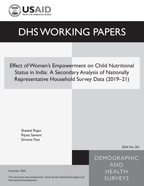There is no printed copy available to order.
Abstract:
Children’s malnutrition is a global concern that has multifaceted consequences for both short-term health and long-term development. The National Family Health Survey-5 (NFHS-5) 2019–21 indicated that 36% of children under age 5 in India were stunted, 19% were wasted, and 32% were underweight, indicating that child malnutrition remains a significant public health concern in India. Efforts to tackle malnutrition have increasingly incorporated measures to enhance maternal empowerment. Given that women often hold the primary responsibility for child care, their empowerment has been linked to improved child health outcomes. Although the body of literature exploring the relationship between women’s empowerment and child nutritional status is growing, a need exists for more comprehensive and context-specific research, particularly in low- and middle-income countries like India. Using data from the NFHS-5, this study investigated how different dimensions of women’s empowerment (such as control over cash earnings, attitudes toward domestic violence, and mobility) were associated with child malnutrition. Data from 30,024 pairs of women age 15–49 and their children under 5 were analyzed through bivariate analysis to determine associations between women’s empowerment and child malnutrition. Both linear and logistic regressions were used to measure the strength of these associations.
Key findings revealed that maternal education, mobile phone ownership, and the age at which a woman first engaged in sexual activity or cohabitation were significantly associated with child stunting, wasting, and underweight status. These results highlight the importance of specific empowerment factors, particularly maternal education and mobile access, in tackling child undernutrition. The results provide essential insights for policymakers aiming to address child malnutrition through targeted interventions that promote women’s empowerment.
 Effect of Women’s Empowerment on Child Nutritional Status in India: A Secondary Analysis of Nationally Representative Household Survey Data (2019–21) (PDF, 704K)
Effect of Women’s Empowerment on Child Nutritional Status in India: A Secondary Analysis of Nationally Representative Household Survey Data (2019–21) (PDF, 704K)
